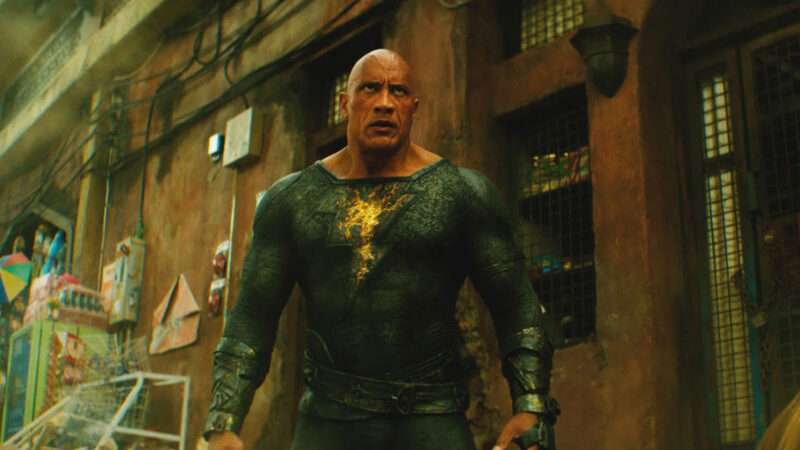
There is an interesting idea lurking at the margins of Black Adam, a noisy new DC Comics superhero movie starring Dwayne "The Rock" Johnson: What if superheroes—the self-styled good guys with strange powers and moral codes—are actually defenders of an ugly, imperialist status quo? Sadly, this muddled, thoroughly mediocre movie whiffs on its most intriguing question, resolving in a shrug and an onslaught of perfunctory computer-generated punching.
The story is set in the fictional middle eastern locale of Kahndaq, which in the past was the site of a brutal slave regime and in the present is ruled by Intergang, a group of stateless, militaristic oppressors. After a shootout and some magical shenanigans involving a mystical MacGuffin known as the Crown of Sabbac, a superpowered being who initially calls himself "Teth-Adam" (Johnson) arises at the word "Shazam." Comic book fans will understand the connection to another superhero who bears that name, but given the clear similarities between the two characters—both wear suits adorned with lightning bolts—more casual viewers may find themselves Googling for background and context.
It's rarely a good sign when a film requires offline reading to fully understand, but make no mistake: This is not a movie concerned with context. Indeed, shortly after Adam's magical rise, the story introduced a quartet of heroes who've never appeared on the big screen before: Hawkman, Dr. Fate, Cyclone, and Atom Smasher, all of whom are given no more than cursory introductions that amount to little more than summaries of their powers, like stats on the back of a superhero trading card.
They call themselves the Justice Society, not to be confused with the Justice League—although, once again, the movie does nothing to clear up any potential confusion. Rather, it simply asserts that this new gang of costumed characters has awesome powers, most of which can be derived just from their names, and thus, the rules of super-movies being what they are, they are destined to fight Adam.
This is where things almost become interesting: The Justice Society declares themselves the good guys, and given the implied association with the Justice League—a DC Comics super-team that typically consists of A-list heroes like Superman and Wonder Woman—even viewers who don't know these characters from the comics are likely primed to think of them that way.
Yet when they arrive in Kahndaq, they go after Adam, who has been busying himself murdering Intergang mercenaries, not the oppressors. Hawkman, their leader, declares them defenders of global stability and demands Black Adam stop with all the extrajudicial killing (he actually uses this phrase). But the people of Kahndaq are on Adam's side. They don't care about stability. They care about freedom from oppression.
So is Adam, who has no compunctions about murder when it suits him, actually a good guy? Does the Justice Society actually represent the side of right? Are superheroes actually just lame, self-deluded imperialists defending privilege? The movie half-heartedly raises these questions but doesn't bother to answer them, preferring super-powered slugfests to anything resembling thematic coherence. Eventually, a unifying villain arises—you can tell he's a bad guy because he's cherry-red, with ram horns, and a demon-deep voice—that unifies the various heroes and anti-heroes, all of whom turn out to be good guys, more or less.
The punching is fine, as far as it goes, and a few of the sequences are reasonably well staged, but it suffers from the same CG bloat that tends to weigh down so many of today's big-budget superhero films. And the movie's colors have been manipulated in ways that are almost distracting: Virtually all of the images look as if they've been run through a particularly aggressive Instagram filter.
The overmuscled, endlessly charming Dwayne Johnson makes a fine Black Adam, although his charm is turned down here by the hero's dour mood. A subplot involving a superhero-obsessed local kid who tries to train the murderous, sullen Adam to be a hero is mostly annoying and largely ripped off from better bits in Terminator 2.
Meanwhile, the idea of using a superhero-obsessed kid as the audience surrogate in a superhero franchise reeks not only of fan service but of a more general unwillingness to engage with anything that might actually connect with the real world: The movie's reason for connecting with this kid, for rooting for him, is based solely in the fact that he's a fan of superheroes—presumably just like the viewers.
It's probably too much to ask a comic book movie starring an ex-wrestler to be a psychologically nuanced treatise on global affairs and pop culture hegemony. Failing that, however, I'd settle for a rousing, entertaining movie. But this dreary computer-generated punch-fest mostly just serves the superhero status quo that, in its best moments, it seems to want to critique.
The post <i>Black Adam</i> Is a Dreary Superhero Slugfest appeared first on Reason.com.







